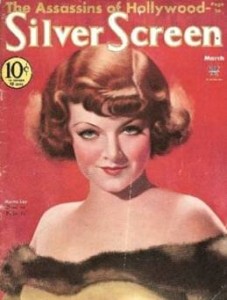1934: Some Grow, Some Swell
(Excerpt)
by Adela Rogers St. Johns
Silver Screen, March 1934
“Some grow, some swell.”
Woodrow Wilson, ex-president of the United States, once made that remark about the men he appointed to important posts in his government.
It applies likewise to Hollywood, where, as the years pass, certain human beings are appointed by the public to the glittering pinnacles of motion picture stardom.
Some grow. Some remain static. Some swell. And some swell up and bust.
No other class of people are as famous as motion picture stars. Their names are known to every man and woman, boy and girl–in every great city, village and hamlet throughout the world. They are better known than statesmen, than champions, than great authors, than any musicians or painters or stage stars. The name of Garbo is known to more people than the name of Frances Perkins, our secretary of labor. Mickey Mouse is familiar to as many people as Franklin D. Roosevelt.
Movie stars earn more money and receive more adoration, more direct worship, than any other class of people who have ever lived.
They come, these fortunate and gilded few, from here, there and everywhere–and nowhere. Sometimes they work hard and long and achieve by genius and great ability. Sometimes they shoot into the glory zone almost overnight, by some trick of personality or appearance or some quality of entertainment that is impossible to name.
And then what?
Some grow, some swell.
It is amusing, sometimes it is tragic to watch the effect of this heady and dizzy height upon human beings. Sometimes they become laughable in their sheer, unadulterated ego–sometimes they are encouraged by appreciation and applause to new and better things and become our greatest stars.
…
Take for instance, Clark Gable.
Some years back, Mr. Gable tried awfully hard to crash the movies. Finally, he gave it up as a bad job. Journeying to New York, he became a stage leading man, just medium successful. He returned to Hollywood in a stage play–and, within a few months, Clark Gable was the greatest sensation pictures had known in years. Girls stormed the studio gates and–more important–the box office. His salary leaped from three minor figures to four very major ones. Famous stars clamored for him as a leading man, even the great Garbo. The story department was busy day and night searching for Gable stories, and producers bowed low when he passed.
Watching from the sidelines, the Gable inflation came so fast it looked like a trick by Houdini.
Would Clark Gable, I remember saying to myself, the boy from an Ohio farm who had never known success nor fame nor wealth, swell up like one of those fishes in an aquarium under this public idolatry? The betting around was ten to one that Mr. Gable would so swell that he would become pretty obnoxious.
But Mr. Gable didn’t swell then and he hasn’t swelled yet. For a time, he remained in a state of suspended animation, reduced to state if coma by these incredible happenings. Then, like a sturdy oak tree, he began to grow.
A certain dignity came to support his shyness and modesty. He gained poise and added certain graces of manner and speech–he learned how to dress and which fork to use. But he didn’t change. He remained quite definitely Clark Gable–only nicer. He did the things he had always liked to do, his talk didn’t center around the pronoun “I”.
I remember, a year or so after Gable’s first sensational success, I dined with him and his charming wife at the home of the Edgar Selwyns. Edgar Selwyn, of course, is a great figure in the American theater. He was himself a famous stage star and matinee idol, a producer of many successes, a fine playwright–and now is a good director. Some discussion about the theater came up and somebody asked Clark Gable a question, in a very flattering manner. Clark grinned boyishly and turned the question over to Edgar Selwyn. From that time on, he kept Mr. Selwyn talking of plays and actors and playwriting all evening–and Clark listened, really listened. He’d been given a chance to shine and show off his somewhat limited knowledge of the stage–and he didn’t do it.
In spite of bad handling and bad stories, Mr. Gable continues to grow both on and off the screen. He’s very, very grateful for his success, and I think he’ll be one of our big stars.
